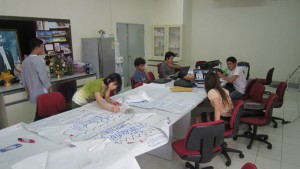 Legal fellow from CLE foundation worked alongside with law lecturers from Vietnam, legal fellow and professor from Australia who worked and volunteered for BABSEA CLE, to develop a CLE training workshop for law students before they provided community legal education. CLE foundation’s legal fellow and volunteers from BABSEA CLE also assisted in the teachings. This project was planned to provide the community education on Acquisition of Thai Nationality to five communities who have personal legal status problems in the Phayao province, Thailand. Many participants could not understand or speak Thai. Therefore, cross-cultural communication was our biggest challenge. To get the most out of it, the teaching and materials needed to be interactive and easy to understand.
Legal fellow from CLE foundation worked alongside with law lecturers from Vietnam, legal fellow and professor from Australia who worked and volunteered for BABSEA CLE, to develop a CLE training workshop for law students before they provided community legal education. CLE foundation’s legal fellow and volunteers from BABSEA CLE also assisted in the teachings. This project was planned to provide the community education on Acquisition of Thai Nationality to five communities who have personal legal status problems in the Phayao province, Thailand. Many participants could not understand or speak Thai. Therefore, cross-cultural communication was our biggest challenge. To get the most out of it, the teaching and materials needed to be interactive and easy to understand.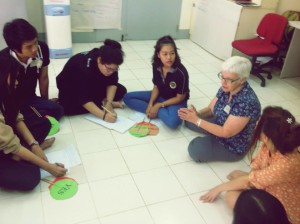 The important thing was to make the participants feel comfortable and not feel divided between highbrow and rural people. Besides providing the community teaching, we also visited the villagers’ house to interview and collect information about their problems.
The important thing was to make the participants feel comfortable and not feel divided between highbrow and rural people. Besides providing the community teaching, we also visited the villagers’ house to interview and collect information about their problems.
Author Archives: Dan
Community teaching at Wildflower Home
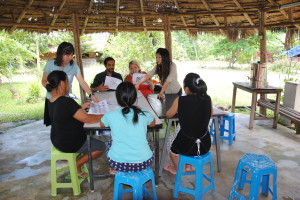 CLE Foundation provides weekly classes for the women at Wildflower Home, who often come from poor or marginalized communities and have little or no knowledge of legal matters. These classes teach basic legal rights and promote human rights awareness, emphasizing the importance of assertion of these rights. The regular classes raise the young women’s awareness of and knowledge about their legal and human rights in everyday situations, with the result that they are empowered to deal confidently with such issues in the future. The Initiative educates specifically about subjects that the young women are likely to encounter when they move on from the Wildflower Home and are establishing their own independent lives.
CLE Foundation provides weekly classes for the women at Wildflower Home, who often come from poor or marginalized communities and have little or no knowledge of legal matters. These classes teach basic legal rights and promote human rights awareness, emphasizing the importance of assertion of these rights. The regular classes raise the young women’s awareness of and knowledge about their legal and human rights in everyday situations, with the result that they are empowered to deal confidently with such issues in the future. The Initiative educates specifically about subjects that the young women are likely to encounter when they move on from the Wildflower Home and are establishing their own independent lives.
In collaboration with BABSEA CLE, CLE Foundation hosts a number of international volunteers, legal experts and interns from different countries. Many others come from neighbouring countries in the region including Vietnam, Laos, Malaysia, Cambodia, and Indonesia. BABSEA CLE, who is partnering with CLE Foundation on this project, runs an externship program for students with many coming from law schools in the United States. BABSEA CLE also has a formal externship partnership with Queensland University of Technology in Australia. Participating interns, volunteers, and visiting experts all have a chance to teach and observe the lessons at Wildflower, allowing them to learn about the different cultures of the women (mostly Thai and indigenous) and the other interns (from all over the world).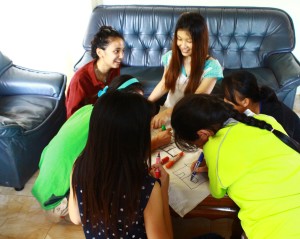 From this, participants can learn about local law and social issues and compare these to their home countries. After their experience at Wildflower, these international beneficiaries can learn from this exposure to real world problems as well as gaining an ethical sense of responsibility to the public and to marginalized communities, which they can then apply at home.
From this, participants can learn about local law and social issues and compare these to their home countries. After their experience at Wildflower, these international beneficiaries can learn from this exposure to real world problems as well as gaining an ethical sense of responsibility to the public and to marginalized communities, which they can then apply at home.
This year, Wildflower Legal Education Initiative has support from the United States Embassy under the Small Grant Program for Outreach to Society 2013. Their support to develop the curriculum to meet the women’s needs, and provide for the interactive teaching materials, which is a highly effective way to teach concepts that are sometimes not straightforward, is very meaningful for this project.
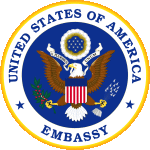
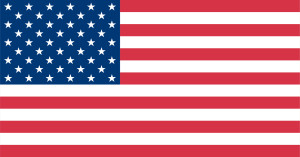
CLE training at North Chiang Mai University
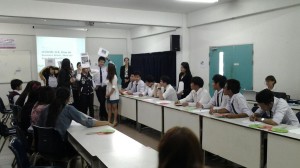 On the 16th of January 2013, BABSEA CLE volunteers (Queensland University of Technology (QUT) internship students and others), joined by a CLE Foundation legal fellow and BABSEA CLE Co-director/Co-founder, Wendy Morrish set off to North Chiang Mai University for three days of Community Legal Education (CLE) workshops. Not counting the lesson preparation undertaken days before, for many this experience was to be the first the interns had with teaching CLE or teaching in general.
On the 16th of January 2013, BABSEA CLE volunteers (Queensland University of Technology (QUT) internship students and others), joined by a CLE Foundation legal fellow and BABSEA CLE Co-director/Co-founder, Wendy Morrish set off to North Chiang Mai University for three days of Community Legal Education (CLE) workshops. Not counting the lesson preparation undertaken days before, for many this experience was to be the first the interns had with teaching CLE or teaching in general.
Another, yet equally as important goal, of the visit to North Chiang Mai University was to collect further data for an active research project of BABSEA-CLE.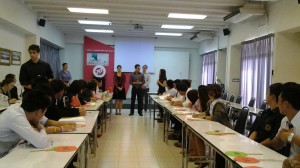 The project, ‘BABSEA-CLE Development of Clinical Legal Education (CLE) in Thailand’, aims to evaluate the effectiveness of current CLE programs in order to make data-driven recommendations to implement, support and further improve CLE programs in the future. The basis for understanding the effectiveness stems from interviews conducted with students and lecturers involved with the CLE programs.
The project, ‘BABSEA-CLE Development of Clinical Legal Education (CLE) in Thailand’, aims to evaluate the effectiveness of current CLE programs in order to make data-driven recommendations to implement, support and further improve CLE programs in the future. The basis for understanding the effectiveness stems from interviews conducted with students and lecturers involved with the CLE programs.